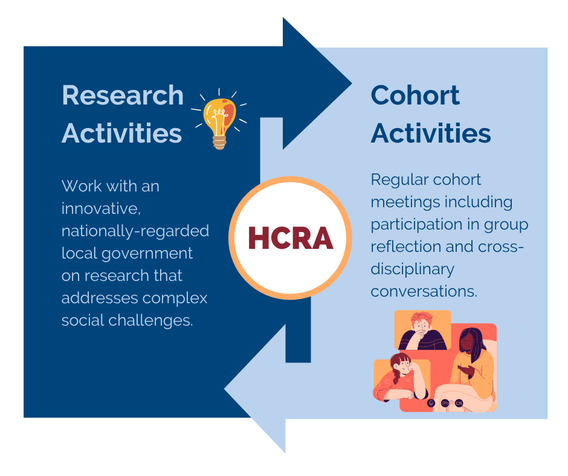Program Overview
Each assistant is matched with a county-identified research question that helps advance policy on complex social challenges related to disparity reduction or climate action. GRAs help design and carry out research to answer the question, with supervision and support from county staff. Throughout the summer, the assistants meet regularly as a cohort to reflect on their work and extend their learning. Cohort activities include:
- building skills in research with a community partner
- participating in group reflection and cross-disciplinary conversations
- networking with county leaders and community partners
2024 Key Details:
- Program Duration: 5/28/24 - 8/25/24
- Hours: 20/wk
- Hourly Rate: $21.58 (MA level), $24.40 (PhD level)
- Location: hybrid work + in-person cohort activities
Eligibility
Students will be employed as summer GRAs. The UMN requires that GRAs be:
- Admitted to a graduate school degree program or a post-baccalaureate professional degree program. Students who graduate spring semester are eligable.
- Authorized to work in the United States (international students who work on-campus are eligible).
Because this is a summer appointment, there is no requirement to register for a minimum number of credits, and assistants will not receive tuition benefits.
In addition to the above eligibility requirements, this program is a good fit for students who:
- Are interested in conducting research with a local government partner
- Value cross-disciplinary, experiential, and group learning experiences
- Have some basic research skills and topical knowledge in their discipline, and want to creatively apply these skills and knowledge to community issues
- Want to explore a career in public service and/or research that addresses racial disparities and other forms of inequity
How to Apply
If you are applying for the AI Translation Research project, disregard what is below and follow the application instructions in the job posting.
- Review Hennepin County’s Disparity Reduction: Vision and Priorities document to familiarize yourself with the county’s work.
- Carefully read our application instructions before preparing your materials.
- Fill out the online application by the deadline. A link to the job posting is in the application instructions.
Selection Process
After the application closes, HUP staff will review applications and invite applicants to first-round interviews in early March. After first-round interviews, HUP staff will extend offers for final interviews. All applicants will know the result of their application by early April.
Applicants will be evaluated based on the following criteria:
- 50%: Ability and motivation to do research with a local government partner. This type of research requires
- Strong communication skills
- Strong interpersonal skills
- Ability to lead a project with limited oversight
- Ability to effectively adapt and work within strong organizational cultures
- Self-awareness of one’s strengths and weaknesses
- 20%: Relevance of skills, experience, and knowledge to the research topics
- 20%: Contribution to the cohort experience. We are not only evaluating each applicant individually, but are also seeking to bring together a diverse group of students who will create a rich cross-disciplinary learning environment as a cohort.
- 10%: How participation in the program will benefit the student in their academic and professional development.
We will use the following sources to evaluate applicants:
- Interview
- Short answer responses
- Resume
- Class list
Previous Cohorts
2022 Cohort
- Lindsey Erdmann, Humphrey School of Public Affairs: created a statistical model that predicts time spent in homelessness based on various factors
- Channel Lowery, School of Social Work: provided guidance on implementing the county’s guaranteed basic income pilot program
- Antara Mandal, Humphrey School of Public Affairs: developed a report on current local capacity for reclaiming wood waste and how to increase it
- Siyu Samantha Ng, Humphrey School of Public Affairs: reported on the prevalence and nature of hate crimes and incidents in the county
- Vanessa Nyarko, College of Liberal Arts: produced communications strategies to advance digital equity and broadband access
- Audrey Robeson, College of Food, Agriculture, and Natural Resource Science: analyzed the impact of flood risk due to climate change on affordable housing development
- Charly Vang, School of Public Health: conducted interviews with parents and local leaders on strategies for kindergarten readiness
2023 Cohort
- Anna Bokun, College of Liberal Arts: helped design an evaluation of the county’s Raise the Baseline cash assistance program
- Mahasweta Bose, College of Education and Human Development: analyzed best practices and stakeholder feedback for youth substance use prevention and supports
- Denisha Demeritte, School of Public Health: evaluated the impacts of NorthPoint’s medical clinic expansion on patient experience and internal productivity
- Jack Gramlich, Humphrey School of Public Affairs: developed a proof of concept for results-focused investment efforts across the county
- Samantha Hunt, Humphrey School of Public Affairs: worked to determine strategies for expanding resident access to weatherization programs
- Melanie Leopold, Humphrey School of Public Affairs: designed a staff engagement plan for developing a county resident access portal
- Chris Robertson, College of Liberal Arts: developed community engagement strategies for Hennepin Health’s violence intervention program
For questions, please email us at [email protected].
